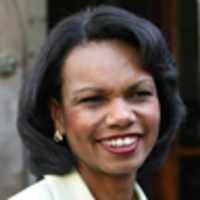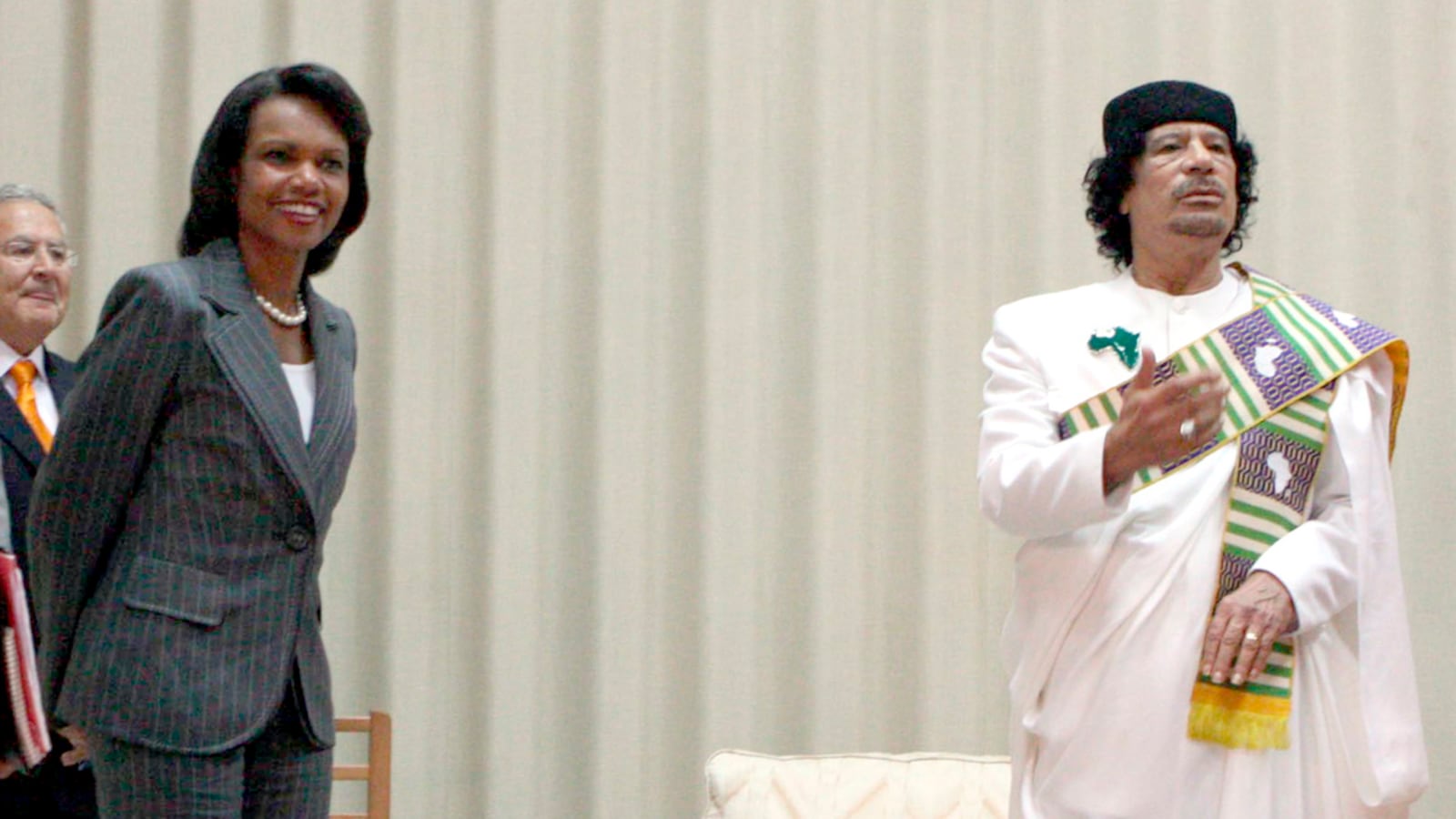My last few months [in office] did not go quietly or without consequence. They even brought historic moments—none more so than my much anticipated visit to Libya to meet with Colonel Muammar Qaddafi. When the Libyans gave up their weapons of mass destruction in 2003, there was a clear diplomatic quid pro quo: in exchange, we’d help them to return to good standing in the international community. But it would not be easy and not only because of Qaddafi’s long record of brutality.
Libya had arrested five Bulgarian nurses and a Palestinian doctor several years before on trumped-up charges that they had deliberately infected more than four hundred Libyan children with HIV. The medics insisted that they were innocent, but the Libyan courts had sentenced the group to death. The United States repeatedly urged Libya to find a way to release them, and I was grateful for the dedication and leadership of European Commissioner for External Relations Benita Ferrero-Waldner on the issue. Libya’s decision in 2007 to commute the sentences and allow the medics to return home was due in large part to Benita’s resolve.

We had to make sure, too, that we were sufficiently attentive to the sensitivities and needs of the families of the victims of the colonel’s decades-long reign of terror. I withheld my visit until we could secure a Libyan claims settlement for families whose relatives had been killed in attacks such as the bombing by Libyan agents of Pan Am Flight 103 over Lockerbie, Scotland, in 1988. My upcoming trip gave me powerful leverage in these negotiations because Qaddafi desperately wanted me to visit Tripoli.
There were two reasons for this: one traditional and the other, well, a little disconcerting. Obviously, the first visit by a U.S. secretary of state since 1953 would be a major milestone on the country’s path to inter- national acceptability. But Qaddafi also had a slightly eerie fascination with me personally, asking visitors why his “African princess” wouldn’t visit him.
I decided to ignore the latter and dwell on the former to prepare for the trip. The arrangements were not easy, with all manner of Libyan demands, including that I meet the leader in his tent. Needless to say, I declined the invitation and met him in his formal residence.
Stopping first in Portugal and staying with my friends Ambassador Thomas Stephenson and his wife, Barbara, I took advantage of Foreign Minister Luis Amado’s knowledge of Libya and Qaddafi. He suggested that I open the conversation with a discussion of Africa. “And don’t be surprised when he says something crazy,” he cautioned. “He’ll get back on track.”
When I arrived in Tripoli, I was asked to wait at one of the only Western-style hotels in the city. There was no doubt that the capital had once been a beautiful place, but it appeared run-down and tired. The only bright lights seemed to be those illuminating the many, many billboards of Qaddafi and his “inspirational” sayings. In speaking with Libyans, a distinct generational divide manifested itself. While the senior staff spoke English fluently and reminded me of my European colleagues, younger officials appeared to have had fewer educational opportunities and little contact with the West. It was another reminder of the sad consequences of Qaddafi’s monstrous rule.
After several hours, we were summoned to the residence, where I greeted the Libyan leader and sat down to hundreds of camera flashes. Qaddafi said a few completely appropriate words, as did I, and the press left. We began the conversation as Amado had suggested, talking about Africa in general and Sudan in particular. Libya, he promised, would help with alternative routes for humanitarian supplies to the refugees. This is going pretty well, I thought. He doesn’t seem crazy. Then, as Amado had predicted, he suddenly stopped speaking and began rolling his head back and forth. “Tell President Bush to stop talking about a two-state solution for Israel and Palestine!” he barked. “It should be one state! Israeltine!” Perhaps he didn’t like what I said next. In a sudden fit, he fired two translators in the room. Okay, I thought, this is Qaddafi.

No Higher Honor: A Memoir of My Years in Washington By Condoleezza Rice 784 pages. Crown. $35.
It was Ramadan at the time of my visit, and after sundown the “Brother Leader” insisted that I join him for dinner in his private kitchen. Colby Cooper, who had overseen the arrangements for the trip, protested that this hadn’t been the plan. My security detail did as well, especially when they were told to stay outside. I thought I could take care of myself and went in. At the end of dinner, Qaddafi told me that he’d made a videotape for me. Uh oh, I thought, what is this going to be? It was a quite innocent collection of photos of me with world leaders—President Bush, Vladimir Putin, Hu Jintao, and so on—set to the music of a song called “Black Flower in the White House,” written for me by a Libyan composer. It was weird, but at least it wasn’t raunchy.
The press was fascinated with my trip, and I sat down for an interview with CNN’s Zain Verjee (who often worked with producer Elise Labott on State Department coverage). Zain asked me about my personal impressions of Qaddafi. I remember that I came away from the visit realizing how much Qaddafi lives inside his own head, in a kind of alternate reality. As I watched events unfold in the spring and summer of 2011, I wondered if he even understood fully what was going on around him. And I was very, very glad that we had disarmed him of his most dangerous weapons of mass destruction. There in his bunker, making his last stand, I have no doubt he would have used them.






